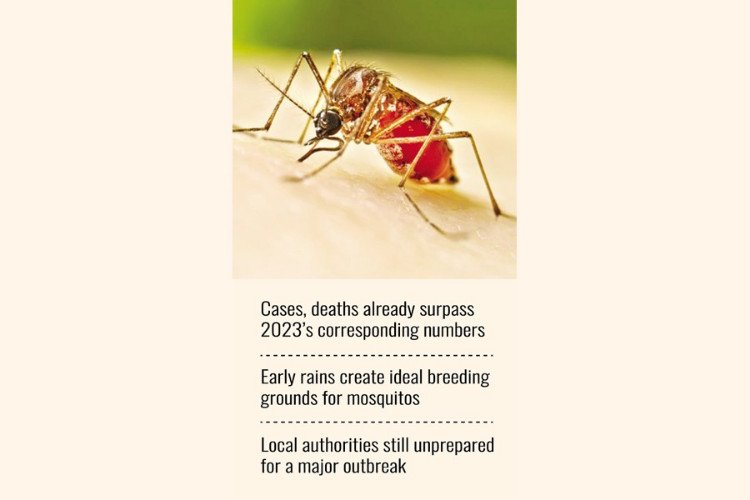
Dengue cases are on a worrying trajectory this year, with early rains coinciding with a surge that surpasses even the record-breaking numbers seen in the same period last year.
This has health experts sounding the alarm over a potentially deadlier dengue outbreak in 2024.
At least 22 people have died from dengue infection this year till April 1, with 1,719 hospitalisations recorded, according to the health directorate. This represents a more than two-fold increase in casualties and hospitalisations compared to the corresponding months last year.
Directorate General of Health Services (DGHS) data shows that 2023 was the worst year for dengue in the country’s 24-year recorded history.
But January alone this year saw a worrying surge, with 14 lives claimed by the mosquito-borne disease.
According to entomologists, early and sporadic rains in March can exacerbate the dengue outbreak by increasing mosquito density. Rainwater creates stagnant water bodies, which are ideal breeding grounds for dengue larvae.
Professor Kabirul Bashar, a renowned medical entomologist and zoology teacher at Jahangirnagar University, told The Financial Express that the dengue season in the country usually starts in May. But, the early rains in March could lead to a premature start to the season.
“Rainfall plays a critical role in dengue spread,” he said. “Rains cause stagnant water, which allows dengue larvae to survive and develop.”
Professor Bashar pointed out the impact of climate change on the country’s weather patterns, which is contributing to the outbreaks.
“Previously, rain typically arrived with the Nor’wester winds. But, we are now seeing unusual rainfall patterns, with March experiencing higher precipitation than usual.”
Meteorologists said March last year saw a 78 per cent increase in rainfall compared to the average. This higher rainfall was directly linked to the severe dengue outbreak that year
This March has also seen 13 per cent higher rainfall than usual in Dhaka, said Md Bazlur Rashid, a meteorologist at the Bangladesh Meteorological Department (BMD), which entomologists say eventually could lead to a two- to threefold increase in dengue larvae survival and potential outbreaks.
A recent BMD study titled ‘Changing Climate of Bangladesh’ suggests climate change is extending the rainy and summer seasons. The study analysed local weather observations from 1980 to 2023 to detect trends and changes.
“Climate change is a global phenomenon, but its local impacts are evident in Bangladesh’s seasonal shifts,” said Bazlur Rashid. “Winters have become shorter, with summers now starting in April instead of March. We are also seeing earlier and heavier rainfall in March.”
The study also found a worrying trend of heatwaves occurring not just during summer but also during the rainy season. “We have even recorded temperatures exceeding 36 degrees Celsius during the monsoon,” Mr Rashid added. “The rainy season itself is no longer confined to June; it is extending beyond that.”
These erratic rains are conducive to dengue outbreaks. Prolonged dry spells kill dengue larvae, but intermittent rain allows them to survive and multiply, leading to a surge in mosquito populations.
The country witnessed dengue outbreaks in all 64 districts last year.
However, entomologists fear this year’s outbreak could surpass the record-breaking 2023 figures, given the higher case numbers already being reported compared to the same period last year.
They urged authorities to strengthen preparations to manage any emerging situation from the mosquito-borne disease.
Professor Kabirul Bashar expressed concern about the lack of preparedness at the local level. “Upazilas and municipalities lack sufficient insecticides, cleaning capabilities and skilled personnel to handle a major dengue outbreak.”
 Weekly Bangla Mirror | Bangla Mirror, Bangladeshi news in UK, bangla mirror news
Weekly Bangla Mirror | Bangla Mirror, Bangladeshi news in UK, bangla mirror news







